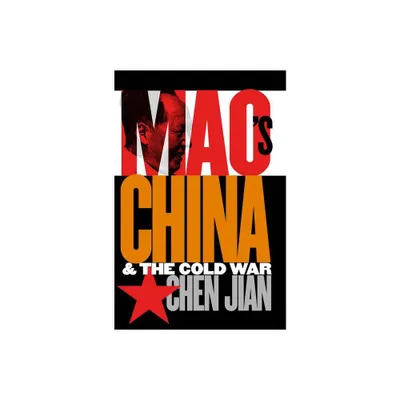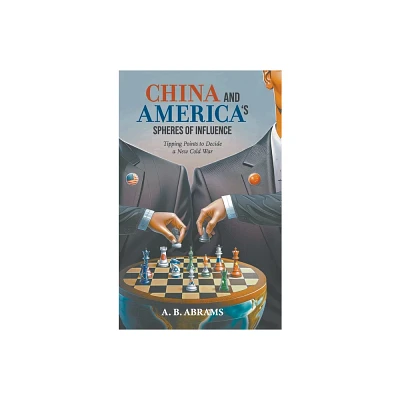Home
Cold War 2.0: Artificial Intelligence the New Battle between China, Russia, and America
Loading Inventory...
Barnes and Noble
Cold War 2.0: Artificial Intelligence the New Battle between China, Russia, and America
Current price: $32.00


Barnes and Noble
Cold War 2.0: Artificial Intelligence the New Battle between China, Russia, and America
Current price: $32.00
Loading Inventory...
Size: Hardcover
*Product Information may vary - to confirm product availability, pricing, and additional information please contact Barnes and Noble
A vivid, thoughtful examination of how technological innovation—especially AI—is shaping the tensions between democracy and autocracy during the new Cold War.
So much of what we hear about China and Russia today likens the relationship between these two autocracies and the West to a “rivalry” or a “great-power competition.” Some might consider it alarmist to say we are in the midst of a second Cold War, but that may be the only responsible way to describe today’s state of affairs.
What’s more, we have come a long way from Mao Zedong’s infamous observation that “political power grows out of the barrel of a gun.” Now we live in an age more aptly described by Vladimir Putin’s cryptic prophecy that “artificial intelligence is the future not only of Russia, but of all mankind, and whoever becomes the leader in this sphere will become ruler of the world.”
George S. Takach’s incisive and meticulously researched new volume,
Cold War 2.0,
is the book we need to thoroughly understand these frightening and perilous times. In the geopolitical sphere, there are no more pressing issues than the appalling mechanizations of a surveillance state in China, Russia’s brazen attempt to assert its autocratic model in Ukraine, and China’s increasingly likely plans to do the same in Taiwan.
But the key here, Takach argues, is that our new Cold War is not only ideological but technological: the side that prevails in Cold War 2.0 will be the one that bests the other in mastering the greatest innovations of our time. Artificial intelligence sits in our pockets every day—but what about AI that coordinates military operations and missile defense systems? Or the highly sophisticated semiconductor chips and quantum computers that power those missiles and a host of other weapons? And, where recently we have seen remarkable feats of bio-engineering to produce vaccines at record speed, shouldn’t we be concerned how catastrophic it would be if bio-engineering were co-opted for nefarious purposes?
Takach thoroughly examines how each of these innovations will shape the tension between democracy and autocracy, and how each will play a central role in this second Cold War. Finally, he crafts a precise blueprint for how Western democracies should handle these innovations to respond to the looming threat of autocracy—and ultimately prevail over it.
So much of what we hear about China and Russia today likens the relationship between these two autocracies and the West to a “rivalry” or a “great-power competition.” Some might consider it alarmist to say we are in the midst of a second Cold War, but that may be the only responsible way to describe today’s state of affairs.
What’s more, we have come a long way from Mao Zedong’s infamous observation that “political power grows out of the barrel of a gun.” Now we live in an age more aptly described by Vladimir Putin’s cryptic prophecy that “artificial intelligence is the future not only of Russia, but of all mankind, and whoever becomes the leader in this sphere will become ruler of the world.”
George S. Takach’s incisive and meticulously researched new volume,
Cold War 2.0,
is the book we need to thoroughly understand these frightening and perilous times. In the geopolitical sphere, there are no more pressing issues than the appalling mechanizations of a surveillance state in China, Russia’s brazen attempt to assert its autocratic model in Ukraine, and China’s increasingly likely plans to do the same in Taiwan.
But the key here, Takach argues, is that our new Cold War is not only ideological but technological: the side that prevails in Cold War 2.0 will be the one that bests the other in mastering the greatest innovations of our time. Artificial intelligence sits in our pockets every day—but what about AI that coordinates military operations and missile defense systems? Or the highly sophisticated semiconductor chips and quantum computers that power those missiles and a host of other weapons? And, where recently we have seen remarkable feats of bio-engineering to produce vaccines at record speed, shouldn’t we be concerned how catastrophic it would be if bio-engineering were co-opted for nefarious purposes?
Takach thoroughly examines how each of these innovations will shape the tension between democracy and autocracy, and how each will play a central role in this second Cold War. Finally, he crafts a precise blueprint for how Western democracies should handle these innovations to respond to the looming threat of autocracy—and ultimately prevail over it.


















